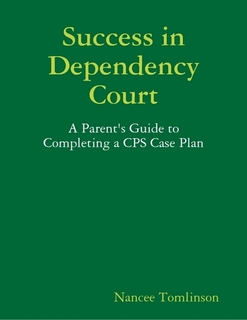

When a Court orders a parent into drug/alcohol rehabilitation, the Court means now.

Does entering rehabilitation mean that child will be returned to the parent immediately? Absolutely not. Rehabilitation requires following a plan and succeeding in small steps as the plan moves forward. The best results come when the employees from the rehab facility testify about the progress and success seen in the parent.
Can a parent wait to enter rehabilitation?
Certainly, but the options for support from CPS and the Court will less forthcoming as time passes. The longer a parent waits the more likely that parent’s rights to a child in state custody will be terminated. 13 months of failing to achieve goals triggers the termination process.
Don’t wait until termination papers are served.
© 2016 Nancee Tomlinson
When parents divorce, hurt feelings and judgmental attitudes do not magically evaporate like the morning fog. At times, one parent may feel that the other parent mistreats their children by failing to meet a need. For example, a parent does not return the child’s clothing at the end of a visit or the other parent changes the sleeping arrangements in a way that the hurt parent disagrees with.
The answer, dear parent, is to resolve the problem between yourselves. Calling Child Protective Services for an issue that does not involve a child being physically or psychologically injured or neglected in an appreciable way does not solve problems.
If you see that your child is injured or being mistreated and neglected, then you should call the police. Take your child to obtain medical treatment. Do you believe that the police should be involved? Should a doctor be treating the child for some injury or neglect? Is this really an issue that needs to be raised? Or are you expecting perfection from the person to whom you are no longer married? Are you being petty?
If you disagree with the other parent’s parenting style or life choices (that do not endanger the child), have a conversation about it. You must decide whether the issue rises to the level of calling your divorce attorney to request a contempt motion, for which you will have to pay. If your children are safe and not exposed to any dangerous people, experiences, or situations, then you might consider letting it go.
CPS should be used for dangerous situations (a child being hurt, physically neglected). If you had the wherewithal to hire an attorney, then you should use the legal means to address your issues before a court. Getting CPS involved in your children’s life means getting the government involved in your life. CPS will turn the microscope on your home as well as your former spouse’s home. Would you sacrifice your rights to your children to harass your former spouse?
How can keeping notes on contacts help a foster child?
Under everyday circumstances, memory may be all a person needs to recall pieces of information. Recollections of speaking with a doctor or doctor’s office and what information was communicated generally provides enough information to move to the next step in the process. In Court, though, one would need to know a date, the name of the person spoken to (say a nurse, not the doctor) and what specifically was said.
This behavior has two benefits.
(1) Being a witness in court is intimidating. The stress can cause one’s memory to freeze up which in turn causes more stress. Creating a written record provides an easy reference for the specific details.
(2) A record of the day to day interactions with school personnel, medical contacts, therapists, case managers, CASAs, you name it, can provide more details that could even show a pattern in a child’s life. In some instances, smaller details that may be unimportant to the foster parent might shift the tide in a dependency case for Child Protective Services or for a Guardian ad litem.
Tracking the details brings greater clarity to the bigger picture of a foster child’s life. Raising a foster child provides many day to day challenges that could over shadow the larger picture. The details do matter as well.
© 2015 Nancee Tomlinson
Clients bring me their plan. The plan to convince the Court that the situation has changed; the client is new person.
The most significant hurdle for clients in this situation is themselves.
“I’ll start after my case is over.” “My friend owes me money. Once they pay up, I’ll change.” Whatever the condition, it’s always tomorrow.
Understand, as I’ve said before, words alone will not prove. A child has been in CPS custody for 12 months. Suddenly a parent realizes that the child could be taken from them permanently. Now, it’s a problem. A parent has been absent and failing to comply with the case plan for a year then all of the sudden it’s an emergency.
12 months in, a parent can’t accomplish the goals meant to be worked over time.
Perhaps it’s a criminal case. A drug case. Client wants rehabilitation. Tells the judge the client is headed to rehabilitation. But suddenly is in jail for new charges. Think that the judge will risk a low bond the second time?
Get moving, get started. Change your plan, change your attitude.
© 2015 Nancee Tomlinson
Clients work to persuade me that the client is ready for change. Having the right words is the first step toward convincing a judge that change is indeed on the horizon. Unfortunately, words alone will not shift a judge’s perspective.
That a client can see and understand the client needs to change is ground breaking for the client. Judges, prosecutors, CPS case managers, and defense attorneys hear stories of change daily without any follow through or accomplishment. Many people working in the system become cynical and believe that no one can change.
The promise of change must be accompanied by action. What is the plan for change? How has the client taken action on this plan? Applied for and enrolled in drug rehabilitation, started therapy for survivors of domestic violence, established a relationship with a therapist and doctor to treat mental health issues, created a routine of attending AA/NA meetings for substance abuse because that’s the only help you can afford.
Words are not enough. Make a plan. Work the plan. A lawyer cannot change a client’s behavior. The prettiest words will not persuade when the words lack force and action. Documentation from these resources, the people providing services, supports the story of change.
CPS/Foster Care cases have plans ordered by the judge. Follow the case plan. Accomplish the steps.
Work with a lawyer to create a plan that will convince a judge that you are ready for change. Follow your case plan, if you have a CPS case.
Actions by a client show the court that change has happened.
© 2015 Nancee Tomlinson
 The first time a parent in juvenile court said to me, “I brought my child to court so that court would teach my child respect. But we just keep coming back and nothing changes. The Judge, DJJ they don’t do anything.” My initial response was wonder. Really, a parent thought a government agency and/or a court could fix that type of problem? Later, after several years of experience, I refined my answer. Unfortunately, neither the Court or the various government agencies are capable of “teaching respect” to a child. Parenting is challenging and an unending task, but no magic switch can be turned on to teach respect. The Court will provide resources for parents. Resources could be therapists to help parents and child communicate better. Classes for both parents and children to find a common ground of respect for each other. There will always be more court appearances, particularly if the parent and child continue to disagree and involve law enforcement or the Department of Juvenile Justice. Parents tell me, in court, that they can no longer control their child and want the government to take control of the child. The parent does not wish to participate in the services offered and the child, in the parent’s mind, is the reason. This statement usually prompts Department of Family and Children Services involvement and whole new level of government and people telling parents what to do. Honestly, parents and children must work together to respect each other from the child’s early days. If a parent decides when a child is 8-12 that the child needs to learn respect, that parent is always the teacher. Care should be taken in communicating thees lessons. Respect does not arise from corporal punishment, usually. Judges and therapists can’t be in a home 24/7 to teach or be the disciplinarian. Parents must do the work of discipline if discipline is to be learned. There are books on the topic of teaching respect; there are also family members and friends who have raised respectful children rely on those resources. The Court is not equipped to fix a child. The Court has a limited number of options to address this type of situation. Most of those options require more court appearances and parent participation to relearn parenting. Do it yourself. Don’t ask the Court to do it for you.
The first time a parent in juvenile court said to me, “I brought my child to court so that court would teach my child respect. But we just keep coming back and nothing changes. The Judge, DJJ they don’t do anything.” My initial response was wonder. Really, a parent thought a government agency and/or a court could fix that type of problem? Later, after several years of experience, I refined my answer. Unfortunately, neither the Court or the various government agencies are capable of “teaching respect” to a child. Parenting is challenging and an unending task, but no magic switch can be turned on to teach respect. The Court will provide resources for parents. Resources could be therapists to help parents and child communicate better. Classes for both parents and children to find a common ground of respect for each other. There will always be more court appearances, particularly if the parent and child continue to disagree and involve law enforcement or the Department of Juvenile Justice. Parents tell me, in court, that they can no longer control their child and want the government to take control of the child. The parent does not wish to participate in the services offered and the child, in the parent’s mind, is the reason. This statement usually prompts Department of Family and Children Services involvement and whole new level of government and people telling parents what to do. Honestly, parents and children must work together to respect each other from the child’s early days. If a parent decides when a child is 8-12 that the child needs to learn respect, that parent is always the teacher. Care should be taken in communicating thees lessons. Respect does not arise from corporal punishment, usually. Judges and therapists can’t be in a home 24/7 to teach or be the disciplinarian. Parents must do the work of discipline if discipline is to be learned. There are books on the topic of teaching respect; there are also family members and friends who have raised respectful children rely on those resources. The Court is not equipped to fix a child. The Court has a limited number of options to address this type of situation. Most of those options require more court appearances and parent participation to relearn parenting. Do it yourself. Don’t ask the Court to do it for you.
© 2015 Nancee Tomlinson
Caregiver’s Compass is now available at Avid Bookshop on Prince Avenue in Athens, GA.
 In my law practice, friends, family, and random callers seek advice and information about Georgia Law. A recent question focused on Truancy in Georgia. A rural community had a parent arrested for a child’s purported 12 or so unexcused absences. The question: does it just happen out of the blue or is there some process before a parent is arrested? Georgia law requires that children between the ages of 6 and 16 attend school. If a child has 5 or more unexcused absences that parent or guardian in control of the child can be charged with a misdemeanor, sentenced to up to 30 days in jail, community service and/or a fine of between $25 and $1000. Each unexcused absence beyond the 5 days can be treated as a separate crime. OCGA 20-2-690.1. In my experience, school systems prefer to deal with the issue by speaking with parents and resolving issues. Only when the parent and child fail to improve on the problem or provide a reasonable explanation do parents go to jail. School systems are required to have a truancy protocol to address these incidents before reaching the arrest and charging level. OCGA 20-2-690.2. Providing written excuses and communicating with the school and the Truancy team can help parents avoid arrest in most cases. Failure to get a child to school on time is the responsibility of the parent under Georgia law. Judges and schools prefer for a child to be school, learning. No one wants to do the paperwork associated with arresting someone, having to appear in court, and deal with the Court system if they don’t have to.
In my law practice, friends, family, and random callers seek advice and information about Georgia Law. A recent question focused on Truancy in Georgia. A rural community had a parent arrested for a child’s purported 12 or so unexcused absences. The question: does it just happen out of the blue or is there some process before a parent is arrested? Georgia law requires that children between the ages of 6 and 16 attend school. If a child has 5 or more unexcused absences that parent or guardian in control of the child can be charged with a misdemeanor, sentenced to up to 30 days in jail, community service and/or a fine of between $25 and $1000. Each unexcused absence beyond the 5 days can be treated as a separate crime. OCGA 20-2-690.1. In my experience, school systems prefer to deal with the issue by speaking with parents and resolving issues. Only when the parent and child fail to improve on the problem or provide a reasonable explanation do parents go to jail. School systems are required to have a truancy protocol to address these incidents before reaching the arrest and charging level. OCGA 20-2-690.2. Providing written excuses and communicating with the school and the Truancy team can help parents avoid arrest in most cases. Failure to get a child to school on time is the responsibility of the parent under Georgia law. Judges and schools prefer for a child to be school, learning. No one wants to do the paperwork associated with arresting someone, having to appear in court, and deal with the Court system if they don’t have to.
© 2015 Nancee Tomlinson



